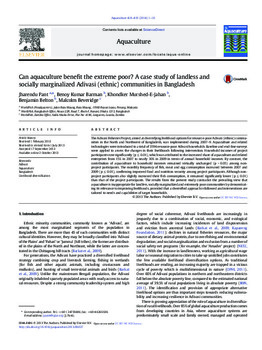Can aquaculture benefit the extreme poor? A case study of landless and socially marginalized Adivasi (ethnic) communities in Bangladesh

Citation
Pant, J. et al. (2013). Can aquaculture benefit the extreme poor? A case study of landless and socially marginalized Adivasi (ethnic) communities in Bangladesh. Aquaculture, 418-419: 1-10
The Adivasi Fisheries Project, aimed at diversifying livelihood options for resource-poor Adivasi (ethnic) communities in the North and Northwest of Bangladesh, was implemented during 2007–9. Aquaculture and related technologies were introduced to a total of 3,594 resource-poor Adivasi households. Baseline and end-line surveys were applied to assess the changes in their livelihoods following intervention. Household incomes of project participants rose significantly, which was attributed to the increased share of aquaculture and related enterprises from 15 per cent in 2007 to nearly 30 per cent in 2009 in terms of annual household incomes. By contrast, the contribution of aquaculture to household incomes remained virtually unchanged among non-project participants. The results from the present study contradict the prevailing view that aquaculture is inappropriate for landless, socially marginalized and extremely poor communities by demonstrating its relevance to improving livelihoods, provided that a diversified approach is followed and interventions are tailored to needs and capabilities of target households.
Permalink
Date Available
Type
Publisher
Countries
ISSN
0044-8486
Research Themes
Topics
Language